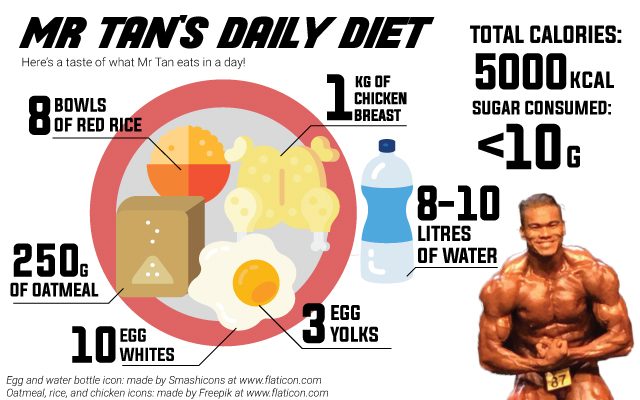
Mr Lex Tan Xue Ming consumes up to 7,000 calories daily, but the 29-year-old makes sure he takes no more than 10g of added sugar on most days.
In other words, he can’t even enjoy a cup of kopi siu dai (coffee with less sugar), which typically contains 16g of added sugar. So forget about soft drinks, bubble tea or Frappuccino.

The competitive bodybuilder and personal trainer keeps to his strict sugar quota on weekdays and allows himself to “cheat” only on weekends.
“On weekends, I treat myself to desserts, but on weekdays … almost no sugar,” said Mr Tan, who is also an associate lecturer for NP’s Sports and Wellness program.
To put things in perspective, Singaporeans consume an average of 50g of sugar daily. This is twice the recommended level by World Health Organization (WHO).
“When I take huge amounts of sugar, I’d feel sleepy within 10 minutes. It hits me really fast,” Mr Tan told The UrbanWire. He added that he prefers going for brown rice and oatmeal for his carbohydrate intake.
Mr Tan started following the strict and clean diet as part of his bodybuilding regimen.
At 11 years old, he was inspired to be an “alpha male” after catching a Hollywood film starring Arnold Schwarzenegger. At 16 years old, he started working out to achieve his dream physique.
“With the money I saved up, I decided to apply for a gym membership, and that got me going.”
Mr Tan now works out 6 days a week and eats 6 to 7 meals a day.
“He packs his meals 365 days a year, and hardly craves for cheats,” said Ms Angeline Huang, 29, Mr Lex’s girlfriend who is also a bikini bodybuilder.
With his teaching position in NP, Mr Tan gets to observe young Singaporeans’ dietary habits closely.
“I feel that teens are taking much more sugar than needed”, he said.
Agreeing with his observation is Mr Rhys Arthur Reutens, an adjunct Personal Fitness Management lecturer at NP. He said concerns about the rise in Type 2 diabetes risk among the youth are valid, as there’s “easier access to high sugar and unhealthy foods such as bubble tea, fast food and buffet”.
“Fresh produce and salad are generally more expensive and more tedious to prepare than fast food,” he added.
But Mr Reutens does not recommend a sugar or carbohydrate-free diet either.
“A lack of carbohydrates may result in headaches, weakness, and retard brain activity,” he warned, adding that people should always eat a variety of food in moderation.
For those who are always craving for the sugar rush, Mr Reutens has these words of advice.
“Sugar gives you a temporary boost, but a healthy diet brings long term (benefits),” he said.
“So it’s a question of ‘Are you looking for short-term, or long-term happiness?’”
